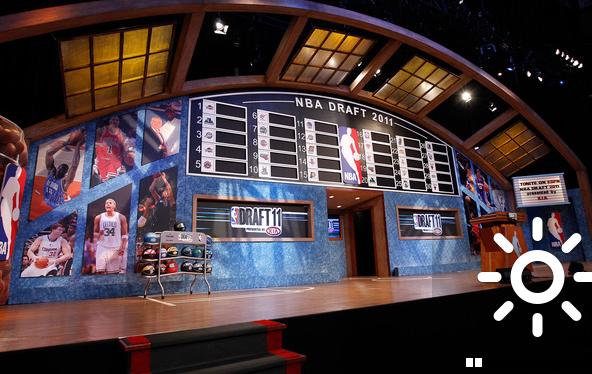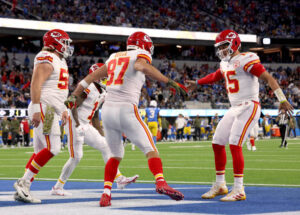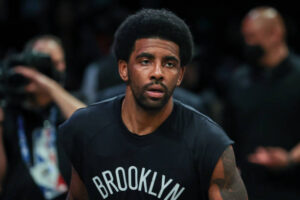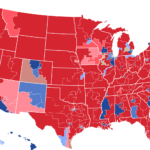As the new NBA season beckons, there are many questions. How will Kevin Durant adjust to life in Golden State colors? Will Karl-Anthony Towns continue his meteoric rise, up the list of greats? Can anyone topple the Cleveland Cavaliers in the East? Are the Utah Jazz finally mature enough to make a run to the get to the playoffs? And the list goes on. Each team has a plan. Everyone has a formula to improve in the short, medium or long term. Most plans inexplicably involve the NBA Draft. In this article a case is made for the abolition of the NBA Draft.
For those unfamiliar, the NBA Draft is an annual meeting where all thirty NBA teams can take turns selecting players to join their teams. The draft is set in order so the teams with the worse record have a better chance to select the “top prospect.” What makes the NBA draft different is the draft lottery system. These unsuccessful teams from the previous season all have the ability to get the top pick by luck of the draw, or better yet ping-pong balls. The bottom line is, the top prospect or player from the collegiate or European ranks is subjected to playing for a bottom ranked team. This is not up for debate. There is no getting around it.
The Draft doesn’t benefit the incoming player
Being a student in college, the goal is to be prepared for the world of work. The student completes the course requirements and then graduates. At that point, the student has the option to seek employment wherever he or she chooses. He or she can set his or her value on the open market. A good example is a nursing student. This person attends school, and graduates with a degree in nursing (whether Associates of Applied Sciences [A.A.S] or Baccalaureate degree in Nursing [B.S.N]). Upon graduation, the student is then required to pass the state board exam, which licenses them to work (NCLEX). Upon completion of NCLEX, the student is now a nurse and is free to pursue employment where he or she desires within the scope and parameters or said license. There is no restriction on where he or she works, or how much money he or she makes.
Now as a student athlete and NBA prospect, life is slightly different. First off, to be draft eligible, he must be of a certain age. He must be at least nineteen years (19) of age or at least eligible to have completed one year of college education. That means Lebron James was forced to stay in Cleveland and Tracy McGrady, a Florida native, was exiled to Toronto Canada to ply his trade. Many believe this is a fair and equitable trade-off with the amount of money the players would make. How naïve and selfish is a person to harbor such a thought process? Just imagine for a moment, that you are forced to leave your homeland and migrate to another country, another culture to ply your trade simply because it’s the accepted norm. In some countries and cultures, that’s been called indentureship.
Please explain why McGrady could not have gotten the chance to sign with either the Orlando Magic or Miami Heat in his home state of Florida, for instance–or for any other team he wanted?
Given the advent of a rookie wage scale, incoming players have very little options with respect to how much money they make. This in addition to where they can work. There are outliers, however, like Steve Francis. Francis refused to play for the then-Vancouver Grizzlies (now the Memphis Grizzlies). When drafted, Francis forced the Grizzlies to trade him to an American team, namely the Houston Rockets. His main reason? He wanted to be near his grand-mother. Francis also cited tax reasons and even mentioned “God’s Will” for good measure. He received a lot of flak for his stance but ultimately he got his wish. But this is a one-in-a-million type example. How would this benefit the player? Is it simply about money?
Factor 1: The Draft will not fix poorly run franchises
As a league, the NBA is all about stuffing its coffers with money. The league believes that this is only viable where there’s parity in terms of talent. This is the party line often given by the league owners and the commissioner’s office. So, by this logic, the worse team is improved with the introduction and inclusion of young top tier talent. While that may appear logical, how come the Sacramento Kings have been mired in mediocrity for the past fourteen years?
In the last five drafts, from 2012 to now, the Kings held the sixth pick, the eighth pick, the seventh pick, the fifth pick, and the eighth pick, respectively. Including those picks, they have selected the following players since 2010. Bismack Biyombo, Thomas Robinson, Ben McLemore, Nik Stauskas, Willie Cauley-Stein, and Marquesse Chris. Not to mention in 2009, the Kings selected Demarcus Cousins. With all that said, the Kings should be competitive as a franchise, except it isn’t.
Of the above-mentioned players, Biyombo, Robinson, and Stauskas are not currently members of the team. McLemore is currently averaging less than ten points per game playing almost thirty minutes per game. Compare that to Giannis Antetokounmpo, Steven Adams, Dennis Schröder, and Rudy Gobert, all of whom were selected well after McLemore. They are all further advanced in their careers than McLemore. The pundits all agree that the draft-class of Ben McLemore was a weak one. Remember, the Cleveland Cavaliers selected Anthony Bennett with the first overall pick that year.
How about the year Cauley-Stein got drafted
Who did the Kings overlook? How about Justice Winslow, Stanley Johnson, Trey Lyles, and Devin Booker? Not to mention, the Kings’ best player is Cousins, who plays the same position as Cauley-Stein and is an all-star. Still not convinced?
The draft of Bismack Biyombo, 2011
It must be noted that Biyombo never played for the Kings; instead he was traded to the Charlotte Bobcats for Jimmer Fredette. First off, where is Fredette playing currently? How about in China? Back to the 2011 draft. After Biyombo was selected, the Golden State Warriors picked Klay Thompson with the eleventh pick. Kawhi Leonard was selected fifteenth by the Indiana Pacers, who traded his rights to the San Antonio Spurs for George Hill. Other notable draftees included Kemba Walker, Tobias Harris, Reggie Jackson, Jimmy Butler, and Kenneth Faried. In the second round of that draft the last pick was Isaiah Thomas, who the Kings acquired via trade on draft night. But after three productive seasons, the Kings traded Thomas to the Phoenix Suns for Alex Oriachi. Who? Exactly!
The Kings organization is the prime example of poorly managed franchises doing absolutely nothing with the access to top tier young talent. There’s an old saying: waste not, want not. The Kings badly need to get that memo. The Kings didn’t deserve the rights to gain initial access to players this high in the process. No, they have been rewarded for years of basketball ineptitude. Those many young players that are unfortunately selected by the Kings absolutely don’t deserve to spend years in what amounts to NBA purgatory.
Now not that the Kings are not the only organization that showed incompetence or laziness with respect to the draft process. Other teams like the Cleveland Cavaliers, the Phoenix Suns, the Milwaukee Bucks, the Orlando Magic, and the New York Knicks are all guilty of the heinous crime of “wastage with intent.” However, most teams have lucked into selecting at least one pretty good to great player among this list. This is not due to the draft process. This is due to simply the law of averages. A team with as many chances in the lottery would eventually select a serviceable to great player. It must be remembered that the Cavaliers actually held the first overall pick three times in the last six drafts. They drafted Kyrie Irving, Anthony Bennett, and Andrew Wiggins. Good news, Irving is a superstar, with Bennett and Wiggins were traded for all-star Kevin Love.
Some teams simply cannot handle prosperity
The most notable draft faux-pas must be the Detroit Pistons, who held the second pick in 2003. The front office led by former player Joe Dumars selected Darko Miličić after the Cavaliers took Lebron James with the first overall pick. Bear in mind, this draft included all-stars Carmelo Anthony, Dwayne Wade, Chris Bosh, Chris Kaman, David West, Josh Howard, and Kyle Korver. There should be a petition against the Pistons preventing them from drafting a player, ever again after that. But the Pistons are not alone.
The Minnesota Timberwolves in 2009 selected Ricky Rubio and Jonny Flynn with the fifth and sixth picks, respectively. Golden State selected future back to back MVP Stephen Curry (who plays the same position as Rubio and Flynn) with the very next pick. Future all-stars DeMar Derozan, Jrue Holiday, and Jeff Teague were all taken later on in that draft.
The Washington Wizards under the leadership of Michael Jordan selected Kwame Brown with at the top of the 2001 draft that included Joe Johnson, Pau Gasol, Tyson Chandler, and Gilbert Arenas. Thankfully it appears Jordan has since improved. In that draft, the San Antonio Spurs with the last pick in the first round selected Tony Parker.
Factor 2: The NBA is Socialist by design
In a feature from the publication Bleacher Report, a case was made for the draft as a necessity for the smaller market teams. The crux of the argument is that the small market teams will have difficulty attracting free-agents. Thus, they are supplemented by the draft to acquire a superstar. Not bad, except the San Antonio Spurs are a relatively small-market team. The players they’ve selected in the draft have been traditionally been surprising to the rest of the league. Apart from Tim Duncan, the Spurs have selected consistently at the bottom of the draft and seems to get gems each year.
Of course, small market teams cannot acquire wanted free-agents–except the Milwaukee Bucks signed Greg Monroe who was pursued by the Knicks and Lakers. The Orlando Magic paid the recently-mentioned Biyombo seventy-two million dollars over four years. The Milwaukee Bucks paid Mathew Dellavedova thirty-eight million dollars over the next four years. The Portland Trailblazers matched the Brooklyn Nets’ offer of four year and seventy-five million dollars to Allan Crabbe.
Commissioner of the NBA Adam Silver stated that some of the teams are losing money. He even intimated that it was the small market teams. It’s safe to say the Magic, Bucks, and Trailblazers are all small market teams. Commissioner Silver, though, was careful not to say how or why that is so. Also, Commissioner Silver neglected to mention that an NBA franchise is worth on average over a billion dollars. This is just a ploy of sympathy and not based in evidence. Even if true, the draft cannot solve those issues; shrewd business practices, however, will.
Factor 3: The draft is American yet un-American
The premise of the draft is totally against the concept of free enterprise. It stifles the freedom to choose your place of employ as noted earlier. That is counter to the capitalist mindset of the “American Dream.” In Europe for example, the sports leagues do not employ a draft system. Take the sport of soccer in general and the English Premiership specifically. Trivia question, which team won the Premiership title last season? Answer, the Leicester City Foxes.
In terms of wealth, they are the eighteenth (18th) ranked team. How were they able to outmaneuver giants like Chelsea, Manchester City, Manchester United, Arsenal, and Tottenham Hotspurs? By having a great farm system. Where the rich teams purchase top end talent, the Foxes developed their own. Somewhere John D Rockefeller would be proud. One’s ability to create can’t be overstated. The draft has allowed laziness to permeate the otherwise hardworking fabric of professional sports.
Potential Alternatives to the draft
First, address the unofficial agreement the NBA has with the NCAA for what it is. The fact that it is said NCAA basketball has suffered due to the “one and done” policy is a farce. To replace the draft a farm system must be in place to harness talent. Major League Baseball has such a system. Have at least three tiers of minor leagues to aid in readying the prospects.
Another bit of legislation to put in place would be the salary cap. This is already in place, so therefore simply tweaking it would be necessary. Remove the ability to have a maximum player salary but keep in place the team’s salary cap. For example, the salary cap for this season is ninety-four million dollars; allow a team to pay a single player whatever percentage of that figure that they see fit. This accomplishes two things. a) It gives the “smaller market teams” the ability to offer a player how much money that they see fit within the structure. And b) It limits a team’s ability to hog all the top-tier talent.
The rationale is that top talent demand top dollar. If such a system were in place during this off-season, it would have been impossible for the Golden State Warriors to afford Kevin Durant. The concept seems insane; however, so too an argument made that to voluntarily subjects oneself to joining a train-wreck organization like the Sacramento Kings.
For those who disagree with the premise, here’s a closing question. What is the purpose of a team having a President of Basketball Operations, Vice-President of Basketball Operations, or a General Manager? Change is often uncomfortable but so too is progress.














103 Responses
Very insightful and thought provoking indeed !